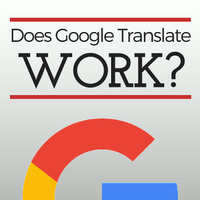Google Translate "Doesn't Work"
I hear all the time that Google Translate doesn't work.
It's not accurate. It's this and that. I think Google Translate is a tremendous resource and not only for language learners. If I get a text in a language that I don't understand, then I can quickly put it into Google Translate and get a sense of what the meaning is, something in Finnish, Hungarian, whatever it might be. It's not 100% and it's better for some languages than others, but I find it extremely useful. Second of all, Google Translate is an excellent dictionary.
It normally gives you a lot of information about the word, some synonyms, the pronunciation, text to speech, so it's a very good dictionary and quite accurate. This depends on the language. It doesn't work as well in Korean as in let's say German or Russian, but by and large it's a very good dictionary. Not only does it do words, it does phrases and that's very useful. Often, if I'm working at LingQ and I look up some individual words and I don't have a good sense of the meaning of these words in combination, I can highlight the phrase, put it into Google Translate (we're connected to it) and I can see the meaning.
Not only that, but you can also work the other way with phrases. ‘In other words', there's a phrase, how do we say that in Czech. There it is jinými slovy. So if you want to improve your language level by having some handy phrases like ‘in other words', ‘in my opinion' or ‘by the way', then you just put it into Google Translate and you get that phrase. So that's its function as a dictionary. It also helps me when I have to write in a language which uses an alphabet other than the Latin alphabet.
For me, to write in Russian I can do it, but it's much faster for me to simply type quickly in English and translate it into Russian. I can go into the Russian and fix up those parts that are not correct and voila, my Russian text, if I have to comment on a forum or something of that nature. It also ensures that my spelling is correct. Now, it works better for some languages than others. It doesn't work so well for Asian languages, but it works very well for European languages, in my experience. The last thing I will say is that I find it very useful sometimes if I want to focus on a particular area of vocabulary, let's say having to do with forestry or something.
I can plunk in a text in English on one side at Google Translate, translate it into Russian, Chinese or whatever language, then I can import that into LingQ and I study saving words and phrases. Overall, the text that Google Translate produces is somewhat unnatural and has errors, but in terms of acquiring the vocabulary I find it tremendously useful. To me, Google Translate is not going to replace translators that are required for legal work or business documents, but it does facilitate people working across different languages and makes it easier for us to learn languages and I don't see that it will replace the need for learning languages.
If I'm in a foreign country like China or Brazil and I want to communicate with the locals, I'm not going to do it through some device that translates it back and forth. I want to speak the local language, learn about the culture, learn about the history and so forth. So Google Translate is a tremendous boon.
It's one of the many sort of technological advances that have made language learning so much easier today than it ever was.

